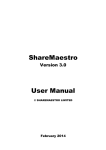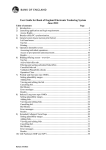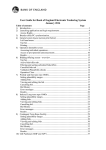Download A User's Guide to late payment legislation:
Transcript
pdf sbs brochure 6/6/02 5:53 pm Page 1 A User's Guide to late payment legislation: The Late Payment of Commercial Debts (Interest) Act 1998, as amended and supplemented by the Late Payment of Commercial Debts Regulations 2002. pdf sbs brochure 6/6/02 5:53 pm Page 2 Index Introduction 4 • Your rights • Changes to the late payment legislation • Legal Warning Section 1: Understanding the legislation 6 • Your rights and how the changes to the late payment legislation will affect them • Definitions in the new late payment legislation • Jurisdiction • How you do business Section 2: What does the late payment legislation provide? 11 • Part 1 - Late payment interest and reasonable debt recovery costs • Part 2 - Grossly unfair terms and conditions Section 3: How to claim 15 • Part 1 - How to calculate late payment interest • Part 2 - Reasonable compensation for debt recovery costs Section 4: How to collect 18 Section 5: Receiving and avoiding claims for interest 21 Section 6: Definition of small and medium-sized enterprises 22 Business Link is a service dedicated to making the UK the best place in the world to start and grow a business. Through our extensive network of providers we offer first class business support, information and advice to people wishing to start up, develop or improve their business. 03 pdf sbs brochure 6/6/02 5:53 pm Page 4 Introduction Your rights The United Kingdom was one of the first countries in the European Union to implement late payment legislation to help promote a culture of prompt payment. There has been a statutory right to interest for late payment for small firms owed money by large firms or the public sector since 1 November 1998, when the Late Payment of Commercial Debts (Interest) Act 1998 came into force. The Act was to have been introduced in 3 distinct phases and until 7 August 2002 phase 2 is in force. This allows small businesses to charge each other statutory interest, as well as large businesses and the public sector, for the late payment of commercial debt. Amended late payment legislation will come into force on 7 August 2002. This legislation will fulfil the UK’s obligations under the European Directive 2000/35/EC on combating late payment in commercial transactions, and has been prepared taking into account responses to the consultation that was held in Spring 2001. 04 The results of this consultation, together with work done by the Small Business Service and other Government Departments, have led to the development and extension of the United Kingdom’s existing late payment legislation. The statutory right to claim interest and the other entitlements being made available from 7 August 2002 are not compulsory and it is for the supplier to decide whether or not to use rights made available. What is meant by "late payment legislation"? Part of maintaining any successful business is good cashflow management and the late payment legislation can help you with your credit management. The phrase "late payment legislation" refers to the amended Late Payment of Commercial Debts (Interest) Act 1998 and the Late Payment of Commercial Debts Regulations 2002. Changes to the late payment legislation See page • An extension of the scope of the late payment legislation 6 • Creditors will be entitled to "reasonable" debt recovery costs 11 • The right for an appropriate "representative body" to challenge grossly unfair contractual terms on behalf of SMEs 14 • The simplification of the calculation of the interest rate for late payment 16 Legal Warning “Part of maintaining any successful business is good cashflow management and the late payment legislation can help you with your credit management.” The User’s Guide has been prepared to provide general guidance only. This guide does not constitute legal advice and reliance ought not to be placed on it. No liability can be accepted by the authors or publishers for its contents. The interpretation of the law on late payment is ultimately a matter for the courts, and users should take their own advice where appropriate. 05 pdf sbs brochure 6/6/02 5:53 pm Page 6 Section 1: Understanding the legislation Your rights and how the changes to the late payment legislation will affect them - Before 7 August 2002 ALL small businesses can use the rights given to them by the "Late Payment of Commercial Debts (Interest) Act 1998 (as per the table below) to claim interest retrospectively. Section 3 "Do I have to claim immediately" provides further guidance about claiming retrospectively. Guidance on how to use the Act, when making a claim for interest that is based upon a sale made before 7 August 2002, is set out in "The Late Payment of Commercial Debts (Interest) Act 1998: A User’s Guide", (URN 00/1308), which will be sent to you free of charge if you ring EC Logistics on 0870 150 2500 and ask for a copy. You can also download it from the website www.payontime.co.uk The table below provides a brief summary of how the legislation worked prior to 7 August 2002. The earliest date from which a commercial contract can create a claim for interest under the late payment legislation. Who can use the legislation From 1 November 1998 Small businesses can claim statutory interest for late payment from large businesses and most of the public sector. What is a public sector body? A public sector body is any Government Department, Government Agency, Non-Departmental Public Body, and local or public authority. What is a representative body? A "representative body" is an organisation established to represent the collective interests of small and medium-sized enterprises in general or in a particular sector or geographical area. How is a SME (small and medium-sized enterprise) defined? An SME has: fewer than 250 employees; and Jurisdiction The explanation of the late payment legislation set out in this document refers exclusively to England and Wales. In Northern Ireland and Scotland, the late payment legislation is very similar, however due to differences in legal proceedings and the impact of devolution, it is essential that businesses and the public sector in either Northern Ireland or Scotland seek appropriate guidance there. We will seek to work closely with the devolved Governments to ensure that the approach to the interest rate and other entitlements is co-ordinated and consistent. Appropriate authorities in Northern Ireland or Scotland can be contacted at: Northern Ireland either has a turnover of less than EUR 40 million or an annual balance sheet total not exceeding EUR 27 million; The Registrar of Companies 64 Chichester Street Belfast BT1 4JX Definition and is independent. Scotland a small business for these purposes has 50 or fewer employees. Section 6 provides the full definition of an SME for the purposes of this legislation. From 1 November 2000 In addition to the above, small businesses can charge other small businesses statutory interest for late payment. Guidance If you are seeking advice on late payment that has arisen from sales agreed before 7 August 2002, you should consult the user’s guide referred to above. - From 7 August 2002 All businesses, irrespective of size, and public sector bodies can claim statutory interest for the late payment of commercial debts. In addition to this the entitlements identified in the introduction will be available. This user’s guide explains how the late payment legislation in England and Wales will work from 7 August 2002. 06 Definitions in the new late payment legislation Guidance: to convert your turnover or annual balance sheet figures into a EURO equivalent, you need to use the reference rate that is published annually by the European Commission, and which can be found in the "Official Journal of the European Communities". Business Environment and Consumer Affairs Branch Enterprise and Industry Division Scottish Executive Enterprise and Lifelong Learning Department 4th Floor Meridian Court 5 Cadogan Street GLASGOW G2 6AT 07 pdf sbs brochure 6/6/02 5:53 pm Page 8 “Purchasers should not negotiate longer credit periods to avoid the possibility of late payment.” All the rights set out in this document should be available throughout the European Union from 7 August 2002. However there may be differences in how these rights are provided. For example, with regard to the right to be able to claim interest for late payment, countries that are within the Euro zone will use the European Central Bank base rate and they will probably add to this 7% and not the 8% uplift that the legislation here provides. Guidance: Businesses involved in commercial contracts with businesses and/or a public sector body not domiciled in England, Wales, Northern Ireland or Scotland, should make sure that they know what their rights are under the late payment legislation of the jurisdiction to which the contract would be subject if a dispute were to arise. Any commercial contract made under the law of another member of the European Union, will have access to entitlements resulting from late payment legislation, which are similar to those identified in this document. How you do business Is the legislation the only way I can remedy late payment? No. A supplier and purchaser can make their own arrangements for a remedy to late payment. This is known as contractual interest. If they do make their own arrangements for contractual interest, the late payment legislation will not apply. However, if they do not make arrangements, the remedies for late payment provided by the late payment legislation will apply. To prevent purchasers abusing the right to agree their own arrangements with the supplier, any such contractual remedy for late payment must be "substantial" otherwise it will be void and the debtor will be unable to rely on it. It will be struck down by the courts and the terms of the late payment legislation will apply to the contract. Any contract terms are void if they (a) confer a contractual right to interest that is not a substantial remedy for late payment of the debt, or (b) vary the right to statutory interest so as to provide for a right to statutory interest that is not a substantial remedy for late payment of the debt, unless the overall remedy for late payment of the debt is a substantial remedy. How will the courts know whether a remedy is substantial or not? In determining whether a remedy is substantial or not, the courts will consider all the circumstances, including the rate of interest that applies to late payments and the length of credit periods. Purchasers should not negotiate longer credit periods to avoid the possibility of late payment. Where a credit period is considered to be excessive, the courts may strike it down and replace it with the 30 days default period provided by the late payment legislation. 08 It will be for the supplier to show that a remedy is not substantial (although the purchaser may have to provide evidence that it is fair and reasonable in the circumstances). The court will then have to judge whether, in all the circumstances (including what is usual for that sector of business), the remedy meets the criteria of a "substantial remedy" set out above. The court will take into account such factors as whether there was equality of bargaining position between the parties and whether standard terms have been imposed. Examples of contract terms which a court might declare void, to the extent that they relate to late payment because they result in there being no substantial remedy for late payment, might include: • a credit period that is significantly different from custom and practice in that industry; • a credit period that is significantly different from other supply contracts operated by the purchaser; • an interest rate on late payment, significantly lower than the statutory rate, that fails to act as a deterrent to the purchaser paying late because it is lower than the purchaser’s theoretical (or actual) cost of agreed borrowing; 09 pdf sbs brochure 6/6/02 5:53 pm Page 10 Section 2: What does the late payment legislation provide? • an interest rate on late payment, significantly lower than the statutory rate, that fails to recompense the supplier for being kept from their money, because it is below the supplier’s theoretical (or actual) cost of agreed borrowing; Whether the purchaser had given any benefit in return for the term in question would be relevant. However, it must be stressed that the courts will look at the issue of a substantial remedy for late payment on a case-by-case basis. • an interest rate on late payment, significantly lower than the rate used in other supply contracts operated by the purchaser or than is normal in that sector of the economy; Guidance: • a contract term that has the effect of reducing the amount of interest that can be claimed, such that the compensation for late payment is insufficient to recompense the supplier or to act as a deterrent to late payment; • excessive information requirements that must be fulfilled under the contract before any credit period might start. The above list is not intended to be exhaustive and might not necessarily apply in every case. How does the late payment legislation affect existing custom and practice? The late payment legislation does not replace existing custom and practice. If the parties have undertaken business on the basis of usual industry practice (for example, payment at the end of the month following the date of the invoice), then this practice will probably still apply. However, if any remedy for late payment is not "substantial", the terms of the late payment legislation will apply. “it must be stressed that the courts will look at the issue of a substantial remedy for late payment on a case-by-case basis” 10 From 7 August 2002 the late payment legislation will provide all businesses and the public sector with 4 entitlements: Part 1 - Late payment interest and reasonable debt recovery costs i) the right to claim interest for late payment; Claim(s) can be made once a payment is deemed late. Remember that if your contract makes provision for late payment interest, the statutory right to interest and the right to reasonable debt recovery costs will not apply. You may wish to contract for reasonable recovery costs to cover the event of late payment or if you are litigating you may be able to recover from the court some of the costs and disbursements incurred or some of your reasonably foreseeable losses flowing from the late payment. ii) the right to claim reasonable debt recovery costs, unless the supplier has acted unreasonably; iii) the right to challenge contractual terms that do not provide a substantial remedy against late payment; and iv) the right for "representative bodies" to challenge contractual terms that are grossly unfair on behalf of SMEs. The first part of this section will address the right to interest and reasonable compensation for debt recovery costs.The second part will deal with contract terms. Don’t I risk antagonising my customers if I use the legislation? Using the legislation is your statutory right and is not designed to jeopardise existing customer relationships. Rather than seeking to encourage claims for interest and/or debt recovery compensation, the legislation’s primary aim is to deter companies from paying their bills late. By treating the legislation as an integral part of your payment terms, customers will become educated to the fact that this is part of the way that you like to do business. When can I claim either or both of them? When is a payment late? Where there is an agreed credit period, and the supplier has agreed, either in writing or orally, a credit period with the purchaser, the payment is late if it is made after the last day of the credit period. If no credit period has been agreed, then the Act sets a default period of 30 days after which interest can run. This default period does not constitute a statutory credit period. Where no credit period is agreed in a contract, the principal debt will still become due from the moment the goods are delivered or the service performed. 11 pdf sbs brochure 6/6/02 5:53 pm Page 12 “the late payment legislation is designed as a deterrent against late payment to be used as part of standard business practices and credit management techniques” The 30-day default period starts running from the later of the actions: • the delivery of the goods or the performance of the service by the supplier; or • the day on which the purchaser has notice of the amount of the debt. A payment is late once the agreed credit period or the default period has expired. What happens if the contract requires advance payment(s)? There are several ways in which a contract can require payment(s) to be made before the goods are delivered or the service is performed. The Act does not give a right to interest unless at least some of the goods have been delivered or part of the service performed unless contractually agreed. If the parties wish to agree otherwise, they will need to make provision in the contract for a substantial remedy instead of statutory interest. Some contracts stipulate that the whole contract price should be paid before the goods are delivered or the service is performed. If payment has not been made before the goods are delivered or the service is performed, then statutory interest starts to run from the day after the day on which all the goods are delivered or the whole service is performed. 12 Other contracts stipulate that payment should be made by instalments in relation to a delivery of any part of the goods or performance of any part of the service. Where payment of such an instalment is made late then statutory interest runs on the instalment from the day after the day on which the part of the goods are delivered or the part of the service is performed. Finally, where an advance payment forms part of the contract price, but is not related to the delivery of some of the goods or performance of part of the service, then statutory interest runs from the day after the day on which all the goods are delivered or the whole service is performed. What happens if there is no agreed credit period but the purchaser usually pays at the end of the month following the month in which the invoice is received? Some purchasers and suppliers have a long-standing relationship in which this kind of payment arrangement has become standard practice. In these cases, the credit period is considered to end on the last day of the month following the month in which the invoice is received. Interest starts to run on the next day. Where either: i) the purchaser is dealing with a new supplier; or ii) there is any other reason to doubt whether this kind of arrangement can be regarded as established practice between the supplier and purchaser the purchaser should ensure that there is an agreed credit period - otherwise the default period of 30 days might apply. How do I make a claim for interest and/or reasonable debt recovery costs? When the payment is late, a supplier should inform the purchaser that he or she is claiming interest on the late payment under the late payment legislation. It may be helpful to indicate the daily rate of interest that will be claimed, although it is not necessary to do so. The amount of compensation for debt recovery costs available is determined by a table, which the supplier can refer to. For the purpose of claiming interest and/or compensation for debt recovery costs notification can be oral, but it is better to put it in writing, as this makes it easier to prove that notice has been given. It is necessary to provide all the information that should be carried on a standard invoice: • how much is owed (it may be helpful to provide the total amount of interest owed at the date of the invoice for interest, and, if the principal has not been paid, the rate at which the interest will continue to accrue); • the amount owed, and what it is owed for (stating which principal debt it relates to, quoting the original number of the invoice that requested payment of the principal debt); • to whom payment should be made; • by what date; • to what address; and • by what method the payment should be made (e.g. cheque, electronic transfer etc). How should I inform purchasers that they will be charged interest and/or reasonable debt recovery costs if they pay late? Rather than using it as a last resort when faced with an overdue invoice, the late payment legislation is designed to be a deterrent against late payment, and to be used as part of standard business practices and credit management techniques. In much the same way as a supplier reminds purchasers that payment is due within a specified time limit, the supplier should also remind them that interest and compensation for debt recovery costs will be charged on overdue invoices using the entitlements provided by the late payment legislation. In addition to informing purchasers verbally of their right to charge interest and/or claim compensation for debt recovery costs as part of standard payment terms, suppliers should state clearly on all written communications, credit application forms, order confirmations, invoices and all contracts: 13 pdf sbs brochure 6/6/02 5:53 pm Page 14 Section 3: How to claim "We understand and will exercise our statutory right to claim interest and compensation for debt recovery costs under the late payment legislation if we are not paid according to agreed credit terms." Do I have to charge interest and/or debt recovery costs to all late payers? No. It is not compulsory to use the late payment legislation. A supplier is free to decide whether or not to make a claim for interest or compensation for debt recovery costs. Part 2 – Void (grossly unfair) contractual terms What are void (grossly unfair) contractual terms? Void (grossly unfair) contractual terms undermine the purpose of the late payment legislation. For example, they might seek to deny the supplier their right to reasonable compensation for debt recovery costs and/or remove or minimise the supplier’s right to statutory interest for late payment. For example, the customer might try to impose unilaterally a reduction in the rate of interest to be charged for late payment and/or increase the length of the credit period. Guidance: See "How you do business" in Section 1, which will also help. What can you do? Any business or the public sector is entitled to go to court and challenge such terms and conditions. 14 See "How you do business" in Section 1. Representative bodies officially recognised as, or having a legitimate interest in representing SMEs may go to court on behalf of the SME(s) and challenge as grossly unfair contractual terms which purchasers wish to rely upon. If the party that makes the challenge is successful, the Court will strike down as void the offending term(s) and the provisions of the late payment legislation will apply instead. Representation in court Small and medium-sized enterprises (SMEs) can ask a representative body to go to court on their behalf. Such a body might represent SMEs as a whole or cover a particular sector or geographical area. Funding There is no specific funding available to support challenges in court against grossly unfair contractual terms. Any representative bodies going to court are subject to normal costs rules and litigation liabilities. This section will be divided into two parts, Part 1 explains how to calculate the amount of interest that you are entitled to and Part 2 advises how much compensation you are entitled to for reasonable debt recovery costs. First however: Do I have to claim immediately? There is no doubt that the older the debt the less likely it will be paid; however a claim for interest against a late payment does not need to be made straightaway. A supplier has six years in England, Wales and Northern Ireland, and five years in Scotland, in which to make the claim (businesses not based in England or Wales should read "Jurisdiction" in Section 1). Receivers or liquidators of a business may pursue its purchasers for interest on late payment going back over this period. Businesses may also claim interest after they have stopped supplying a purchaser. Purchasers who wish to avoid future claims for interest should pay their bills on time. The six-year period is derived from case law and the Limitation Act 1980. This creates a reasonable expectation that it would be possible to pursue and claim statutory interest for late payment up to 6 years (5 years in Scotland) retrospectively, or back to the time when the appropriate legislation came into force, whichever is the shorter of the two periods (businesses not based in England or Wales should read "Jurisdiction" in Section 1). Guidance: The issue of limitation, not being able to claim retrospectively, will only arise in 2004 in England and Wales because claims for late payment interest under the late payment legislation cannot pre-date the coming into force of the relevant part of the legislation, see the table below. Can I charge retrospectively on my existing debtors’ list? Yes. It is possible to claim statutory interest for late payment up to 6 years in the past (5 years in Scotland), or as far back as the appropriate legislation (see table below) is available, whichever is the shorter period. Can an independent representative body challenge void (grossly unfair) commercial contract terms and conditions without having been requested to by at least 1 SME? The earliest date from which a Who can claim back for that? commercial contract can create a claim for interest under the late payment legislation. Yes. As long as the representative body has a demonstrable, relevant link with the SME(s), and has been set up specifically to act in the interests of SMEs as a whole or for a particular sector or geographical area. From 1 November 1998 Small businesses can claim statutory interest for late payment from large businesses and most of the public sector. From 1 November 2000 Small businesses can also claim statutory interest for late payment from other small businesses. From 7 August 2002 Anyone involved in a commercial contract can claim statutory interest or claim compensation arising from late payment. 15 pdf sbs brochure 6/6/02 5:53 pm Page 16 “If the purchaser owes the principal and interest, unless payment is accepted on other terms, any part payment of the debt will go to reduce the amount of the interest first” Part 1 - How to calculate late payment interest What rate of interest can be charged? At the start of a six-month period the official dealing rate of the Bank of England (the base rate) will be made a fixed "reference rate" for the subsequent six months. The table below shows how this works. The six-month period The Bank of England base 1 January to rate on 31 December, will 30 June be the "reference rate" for The Bank of England base 1 July to rate on 30 June, will be 31 December the "reference rate" for To determine what interest rate you should use when calculating interest on a late payment, you need to add 8% to the "reference rate" that covers the six-month period in which your debt became late. Example How do I find the correct base rate to use? Debt is £851.06 plus £148.94 VAT The correct interest rate to be used can be found by visiting www.payontime.co.uk The Better Payment Practice Group will also issue a press release with the base rate to be used for the forthcoming 6-month period. The Bank of England base rate on the 30 June or 31 December can be found by looking in the financial pages of the national press of the appropriate date (libraries will be able to help) or by visiting the Bank of England website at www.bankofengland.co.uk. How do I calculate the interest charge? The interest owed on a late payment is simple, not compound, interest. It is calculated like this: Debt x interest rate x the number of days late 365 If the base rate is 4% for the six-month period when the debt became late, then the statutory interest rate is 12% (4% base rate plus 8%) = total £1,000 Part 2 - Compensation arising from late payment How much compensation am I allowed? The table below shows how much compensation you are entitled to. Size of the unpaid debt To be paid to the creditor. If this debt is 30 days late, then the interest owed is: Up to £999.99 £40 £1,000 x 12% = £120 (the annual rate) £1,000 to £9,999.99 £70 £120 ÷ 365 = 32.9p (the daily rate) £10,000 or more £100 32.9 pence x 30 days = £9.86 (the interest owed to date) When does the interest stop running? Interest stops running on a debt once the principal has been paid i.e. once payment is received but not yet cleared if relevant. If the purchaser owes the principal and interest, unless payment is accepted on other terms, any part payment of the debt will go to reduce the amount of the interest first. Do I calculate inclusive or exclusive of VAT? You charge interest on the gross amount of the debt (including any element of VAT), but you do not pay VAT on the interest. 16 17 pdf sbs brochure 6/6/02 5:53 pm Page 18 Section 4: How to collect How do I collect the interest for late payment and/or the debt recovery compensation? The interest and compensation are payable by law. It is up to the supplier to decide whether or not to enforce this right. It is good business practice to agree payment terms "up-front", preferably in writing. You could also agree interest and compensation provision or alternatively indicate that you will rely on the statutory rights, see the penultimate question of Part 1, Section 2. If the purchaser pays late, then the supplier should make a written demand for the interest and/or compensation for debt recovery costs as described earlier in Section 3. Guidance: This entitlement to compensation for debt recovery costs does not affect your other rights, and you may still go to court to recover specific fees and charges paid to specialist firms or advisers if you feel that is necessary. If you do go to court the statutory compensation can be recovered along with late payment interest. Can my right to interest or compensation for debt recovery costs be sold or transferred to another party such as factors or collection agencies? Yes. If any part of the debt - i.e. the interest or the principal or both - is assigned to a third party, the original supplier should inform the purchaser in writing, saying to whom the debt has been assigned. The third party, regardless of its size, can then pursue the debtor through the courts for the interest etc. Sometimes a supplier sells a debt without notifying the debtor. When this happens, the transfer is effective as far as the original supplier and the third party are concerned. However, as far as the debtor is concerned, the debt is still owed to the original supplier, and it is only the original supplier who can pursue the debtor through the courts. The person entitled to receive the money can employ an agent to collect it for them. For example, a supplier might employ a debt collector to act as its agent in seeking 18 to collect from the debtor, without actually transferring the debt. Similarly, a factor might expect a supplier to act as its agent by continuing to press debtors for payment of debts they have sold to him. Someone who is acting as an agent in this way can calculate and claim interest and invoice for it. Some agencies offer a legal service, enabling them to issue court proceedings. If this happens, and once all collection methods and negotiations have been exhausted, if the supplier considers that his/her claim for interest and/or compensation for debt recovery costs is a proper one, he/she can go to court or consider the following actions: The supplier can transfer the whole debt (that is, both the principal sum and the interest) or the principal sum alone, or the interest alone. Where only part of the debt has been transferred, the supplier can act as an agent for the third party in respect of the transferred part, and the third party for the supplier for the part that has not been transferred. • to refuse to trade on credit terms with the purchaser in the future; Whatever the arrangements between the supplier and third party, the purchaser will never be required to pay interest twice on the same debt. What happens if a purchaser does not agree with the interest or compensation for debt recovery costs that is charged to them? A purchaser may not agree with an interest charge (for example, if the goods delivered were faulty and had to be repaired, or they were delivered late). If this happens, the purchaser may negotiate with the supplier to reduce or amend the interest charge. • to withhold the supply of further goods or services until interest is paid; • to negotiate with the purchaser to ensure that future invoices are paid on time. How do I use the courts to collect payment? If the purchaser does not pay the interest and/or compensation for debt recovery costs, the supplier can pursue the claim through the courts. Taking someone to court can be an effective method of debt recovery, but not always the best option for example, if your debtor is insolvent, the chances of recovering the debt are minimal and you will have incurred court costs as well. The court procedures are designed to be quick and easy to operate. County Court offices can provide information about court procedures, copies of the forms and help with filling them in. The addresses and telephone numbers of County Courts are listed in the telephone directory under "Courts". Sometimes the purchaser may be unable to reach any agreement with the supplier. 19 pdf sbs brochure 6/6/02 5:53 pm Page 20 Section 5: Receiving and avoiding claims for interest Recently, the Court Service has launched a facility called "Money Claim Online", where it is possible to claim debts of less than £100,000 electronically using the internet, more information can be found at www.courtservice.gov.uk/mcol/ . The supplier should, as a matter of best practice give notice to the purchaser of an intention to issue proceedings to recover the interest and/or compensation for late payment. If legal proceedings are taken, the purchaser may set out the grounds of his dispute to contest the claim. It will then be for the court to decide the matter. Going to court or using Money Claim Online should be a last resort. Be sure that you have tried all other solutions, including alternative dispute resolution, if appropriate, the Court Service offers guidance on this. The court will expect the parties to act reasonably in exchanging information and documents relevant to the claim prior to litigation being launched and generally in trying to avoid the necessity for the start of proceedings. 20 How will a County Court Judgment affect the purchaser? If the court makes an award against the purchaser, the purchaser may find that their credit rating is detrimentally affected if they do not make the payment within a month, because this non-payment will be registered at Registry Trust Ltd. (the register of County Court Judgements), and this information will be made available to credit references agencies and any other party searching the registry. This will make obtaining credit in the future much more difficult, as the purchaser will be perceived as a poor payer. Are there any valid grounds for disputing interest and/or compensation for debt recovery costs claims? The purchaser may ask the court to be excused from paying part or all of the interest or debt recovery costs, either as a defence to a claim made by the supplier or by applying to the court themselves. This might happen, for example, if the supplier did not give the purchaser enough information about the amount owed, where payment should be sent or by what method it should be made (cash, cheque etc), or was otherwise unreasonable in its conduct. The court has the power to remit interest that is due either partially or wholly. What do I do if I receive a claim for interest? If the payment was made late then interest and compensation for late payment are due and payable under the late payment legislation (see Section 2 – What does the late payment legislation provide?). The supplier has a legal right to the interest and compensation for debt recovery costs, and if necessary, to seek enforcement through the courts for non-payment. To avoid litigation, if any interest and/or compensation for debt recovery costs are legally due and have been claimed, they should be paid. If there is a genuine dispute, or the charge has been made incorrectly, then the claim should be queried at once. How can I ensure that I don’t receive a claim for interest and/or compensation for debt recovery costs? • Purchasers must not enter into a contract that realistically they do not think they will be able to fulfil. (A purchaser’s reputation and credit rating will be damaged, notwithstanding the increased risk of having to pay significantly more than originally envisaged as interest accrues and compensation is claimed.) • Purchasers should ensure that agreed payment terms are complied with. • Purchasers should reconcile invoices and statements of account promptly. • Purchasers should raise any genuine complaints or disputes as soon as they arise, and at the very latest upon receipt of an invoice. • If a dispute or complaint arises, purchasers should obtain (where possible) written confirmation from the supplier that a query exists. As a supplier, how can I protect my right to claim interest and compensation for debt recovery costs? • Suppliers should evaluate in advance the purchaser’s financial status to minimise the risk of providing goods or services to a company that cannot or will not pay. • Suppliers should send accurate invoices and statements of account promptly. • Suppliers should ensure that genuine customer complaints or disputes are resolved as early as possible and should act reasonably at all times. • Suppliers should have an effective collection system in place to ensure compliance with agreed terms. Can purchasers and suppliers work together to promote a better payment culture? Good communication between supplier and purchaser can help reduce the incidence of late payment. Purchasers and suppliers should ensure that payment terms are agreed at the start of the trading relationship and that they are clear to all parties. 21 pdf sbs brochure 6/6/02 5:53 pm Page 22 Section 6: Definition of small and medium-sized enterprises This extract is taken from the Commission Recommendation 96/280/EC of 3 April 1996 concerning the definition of small and medium-sized enterprises (OJ L 107, 30.4.1996, p. 4). 2.Where it is necessary to distinguish between small and medium-sized enterprises, the 'small enterprise' is defined as an enterprise which: 1.Small and medium-sized enterprises, hereinafter referred to as 'SMEs', are defined as enterprises which: • has either, • has fewer than 50 employees and • an annual turnover not exceeding EUR 7 million, or • have fewer than 250 employees, and • have either, • an annual balance-sheet total not exceeding EUR 5 million, • an annual turnover not exceeding EUR 40 million, or • conforms to the criterion of independence as defined in paragraph 3. • an annual balance-sheet total not exceeding EUR 27 million, 3.Independent enterprises are those which are not owned as to 25 % or more of the capital or the voting rights by one enterprise, or jointly by several enterprises, falling outside the definitions of an SME or a small enterprise, whichever may apply. This threshold may be exceeded in the following two cases: • conform to the criterion of independence as defined in paragraph 3. 4.In calculating the thresholds referred to in paragraphs 1 and 2, it is therefore necessary to cumulate the relevant figures for the beneficiary enterprise and for all the enterprises that it directly or indirectly controls through possession of 25 % or more of the capital or of the voting rights. 5.Where it is necessary to distinguish micro-enterprises from other SMEs, these are defined as enterprises having fewer than 10 employees. 6.Where, at the final balance sheet date, an enterprise exceeds or falls below the employee thresholds or financial ceilings, this is to result in its acquiring or losing the status of 'SME', 'medium-sized enterprise', 'small enterprise' or 'micro-enterprise' only if the phenomenon is repeated over two consecutive financial years. 7.The number of persons employed corresponds to the number of annual working units (AWU), that is to say, the number of full-time workers employed during one year with part-time and seasonal workers being fractions of AWU. The reference year to be considered is that of the last approved accounting period. 8.The turnover and balance sheet total thresholds are those of the last approved 12-month accounting period. In the case of newly-established enterprises whose accounts have not yet been approved, the thresholds to apply shall be derived from a reliable estimate made in the course of the financial year." • if the enterprise is held by public investment corporations, venture capital companies or institutional investors, provided no control is exercised either individually or jointly, • if the capital is spread in such a way that it is not possible to determine by whom it is held and if the enterprise declares that it can legitimately presume that it is not owned as to 25 % or more by one enterprise, or jointly by several enterprises, falling outside the definitions of an SME or a small enterprise, whichever may apply. 22 “In the case of newly-established enterprises whose accounts have not yet been approved, the thresholds to apply shall be derived from a reliable estimate made in the course of the financial year” 23 pdf sbs brochure 6/6/02 5:53 pm Page 24 Additional copies and further information You can download this publication and find out more information about the Better Payment Practice Group by visiting You can order further free copies of this guide and other Business Link publications from: www.payontime.co.uk DTI Publications Orderline ADMAIL 528 LONDON SW1W 8YT Business Link provides advice and support to small businesses. For more information about the range of services available please call: 0845 600 9 006 Or visit www.businesslink.org Tel: 0870 1502 500 Fax: 0870 1502 2333 Telephone (for the hard of hearing): 0870 1502 100 Email: [email protected] 0 The Better Payment Practice Group is a public private partnership whose objectives are to raise awareness levels of the late payment legislation and promote good credit management practice Printed in the UK on recycled paper with a minimum HMSO score of 75. First published April 2002. Department of Trade and Industry. Crown Copyright. http://www.dti.gov.uk/ DTI/Pub 6042/6k/4/02/NP.URN 02/883 Business Link is bought to you by the Small Business Service (SBS) – the agency within Government championing small businesses. 0




















